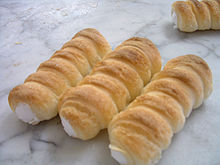Schaumrolle
 Tube-shaped Schaumrollen | |
| Alternative names | Schillerlocken |
|---|---|
| Type | Puff pastry |
| Place of origin | Austria |


Schaumrollen, or Schillerlocken (German: [ˈʃɪlɐˌlɔkn̩] ), are an Austrian confection. They consist of a cone or tube of puff pastry filled with whipped cream or meringue. They are about 3 inches (7.6 cm) wide. The pastries are made by wrapping thin pastry strips around a cone shaped metal tube. After baking, they are filled with the "foam", which is usually sweetened whipped cream or meringue. The pastry tubes are often rolled in coarse sugar or powdered sugar before baking, for extra sweetness and a crunchy texture.[1]
History
[edit]This is a variety of a cream horn, which was brought to North America by Mennonites from the Austrian-Hungarian Empire.[2] Also popular with immigrants from the Danube region (such as the Danube Swabians[3]), Schaumrollen or Schillerlocken can be made up to five inches long, and are served as a treat on major holidays such as Christmas, as well as at weddings and first Communion celebrations.[4] In Austria, they are consumed throughout the year as a treat or afternoon snack, alongside a cup of coffee.
Nutritional information
[edit]Like many pastries, this dessert is high in calories; an Austrian Schaumrolle is estimated to have almost 200 calories per single piece, of which 46 percent are fats, and 49 percent carbohydrates.[5]
Name of the dessert
[edit]
Schillerlocken, the alternate name for the pastry, goes back to Anton Graff's Portrait of Friedrich Schiller. The portrait shows poet Friedrich Schiller with his blond curls in relatively casual pose sitting at a table. This portrait, which is now located in Dresden in the Kügelgenhaus, was often copied and found widespread use as a copper engraving, which led to the emergence of the naming of the pastry in popular culture.[6]
In Germany, Schillerlocken also refers to smoked dogfish belly flaps.[citation needed]
See also
[edit]- List of foods named after people
- List of pastries
- Cream horn
- Mille-feuille
- Sachertorte
- Torpedo dessert
- Vol-au-vent
- Blintz
References
[edit]- ^ IREKS-Arkady-Institut für Bäckereiwissenschaft (Hrsg.): IREKS-ABC der Bäckerei. 4. Auflage. Institut für Bäckereiwissenschaft, Kulmbach 1985.
- ^ "Schillerlocken (a.k.a. Cream Horns)". Carolynn's Recipe Box. n.d. Retrieved 13 May 2014.
- ^ Duhatschek, Katharina; Duhatschek, Monica (2019). The Danube Swabian Cookbook (2nd ed.).
- ^ "Schaumrollen/Schillerlocken (Showm-rol-len) – Cream Rolls". Donauschwaben Villages Helping Hands: Remembering Our Danube Swabian Ancestors. 31 December 2007. Retrieved 13 May 2014.
- ^ "German Schaumrolle Pastry". Fat Secret. n.d. Retrieved 13 May 2014.
- ^ Robert Eberhardt (Hrsg.), Friedrich Dieckmann: Anton Graff – Porträts eines Porträtisten. Wolff Verlag, Berlin 2013, S. 121
